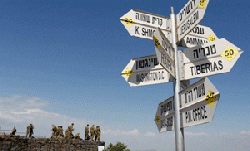Recent incidents in the Golan Heights continue to cast a shadow on the attitudes of Israeli leaders amid reports that Israel plans to carry out new strikes in Syria. These future attacks would be in fulfillment of Israel’s declared policy of preventing strategic weapons from being transferred through Syria to Hizbullah.
The Israeli leadership is trying to predict Syria’s reaction to any upcoming strikes, though Israeli circles purport that if the state were to carry out any attack, it would certainly be met with a Syrian response. Press reports pointed out that this comes in the context of the current tensions in the occupied Golan Heights, after the Syrian army opened fire at an Israeli patrol in the area.
For his part, Israel Air Force Chief Maj. Gen. Amir Eshel warned on Wednesday that if Syria collapses, “we could find its vast arsenal dispersed and pointed at us.” The Syrian state, he said, was changing “before our eyes.”
During his remarks at a national security conference held by the Fisher Brothers Institute, Eshel stressed the importance of Israel maintaining air superiority, and spoke about Syria’s efforts to develop its air defense capabilities. Eshel said that the Assad regime has invested much to achieve the best air defenses, but insisted that Russia has not yet delivered the advanced S-300 platform to Syria, despite contrary claims by the Arab press.

|
| Israeli soldiers stand near signs pointing out distances to different cities at an observation point on Mount Bental in the Israeli-occupied Golan Heights, May 5, 2013. PHOTO: REUTERS/Baz Ratner |
However, Eshel warned that Syria’s possession of the platform would not only represent an operational threat, but also boost its confidence to act more aggressively since the platform could act as a protective umbrella. If the Syrians felt they were immune, Eshel said, then they would carry out actions otherwise unthinkable.
Eshel said that Israel is facing a scenario that is very different in scope from the Yom Kippur War in terms of the type of threats and the timeframe. However, Eshel admitted that the homefront would suffer in such a war.
In the same vein, Deputy Foreign Minister Zeev Elkin said that Israel would not accept for the rules of the game to change in the Golan, and proclaimed that Israel would respond firmly to any attack on its troops from the Syrian territory. Elkin went on to say that any attack in the Golan Heights or any attempt to transfer advanced weaponry to Hizbullah would force Israel to respond.
On the other hand, press reports concluded that the statement issued by the Syrian army over the incident where an Israeli unit came under fire in the Golan meant that Assad, despite the bloody war he is fighting against the rebels, is not afraid of confronting Israel. According to the same reports, Israel believes that Iran was behind the incident, and said that the latter is putting pressure on Assad to initiate war against Israel in the Golan.
Nevertheless, the reports maintained, the Israeli leadership still does not know whether the Syrians fired at the Israeli patrol at the orders of the high command, that is, the Syrian president, or whether it was the initiative of individual Syrian soldiers. The press reports added that the Israeli army was trying to assess how the Syrian army would act in the future, and whether the incident was the beginning of a war of attrition.
The same reports mentioned that there are intensive preparations in the Golan region these days, while the security establishment in Israel is working to complete a nearly ten-mile-long border fence by July, with the aim of protecting the local residents.
Meanwhile, Giora Eiland, Israel’s former national security adviser, said that Syria has become a key battlefield in the confrontation between Russia and the U.S., adding that it is becoming increasingly clear that Russia is backing Assad, something that is a cause for concern in Tel Aviv and Washington.
Eiland said that U.S. policy, in the view of Russian President Vladimir Putin, seeks to undermine Russia by questioning Putin’s legitimacy. Eiland noted that as long as Putin perceives U.S. policy in this manner, then he will spare no means to undermine the U.S. through actions in Syria.
In the end, Eiland called for a grand bargain with Russia, and said that Israel should influence the U.S. over its relations with Russia, but not put pressure on the latter directly, because that would be futile as Putin would never accept dictates from anyone.
– Al-Akhbar






Leave a Reply